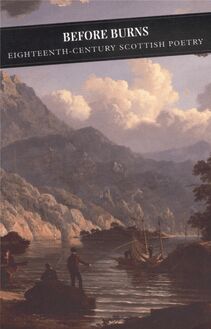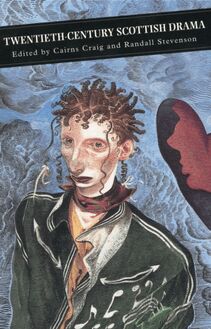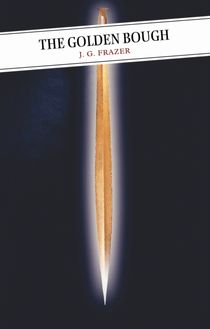-
 Univers
Univers
-
 Ebooks
Ebooks
-
 Livres audio
Livres audio
-
 Presse
Presse
-
 Podcasts
Podcasts
-
 BD
BD
-
 Documents
Documents
-
- Cours
- Révisions
- Ressources pédagogiques
- Sciences de l’éducation
- Manuels scolaires
- Langues
- Travaux de classe
- Annales de BEP
- Etudes supérieures
- Maternelle et primaire
- Fiches de lecture
- Orientation scolaire
- Méthodologie
- Corrigés de devoir
- Annales d’examens et concours
- Annales du bac
- Annales du brevet
- Rapports de stage
La lecture à portée de main

Vous pourrez modifier la taille du texte de cet ouvrage
Découvre YouScribe en t'inscrivant gratuitement
Je m'inscrisDécouvre YouScribe en t'inscrivant gratuitement
Je m'inscrisEn savoir plus
Vous pourrez modifier la taille du texte de cet ouvrage
En savoir plus

Description
Sujets
Informations
| Publié par | Canongate Books |
| Date de parution | 01 juillet 2010 |
| Nombre de lectures | 0 |
| EAN13 | 9781847675842 |
| Langue | English |
Informations légales : prix de location à la page 0,0480€. Cette information est donnée uniquement à titre indicatif conformément à la législation en vigueur.
Extrait
Contents
NORMAN MacCAIG
After
Summer Farm
Feeding Ducks
Byre
A Man I Agreed With
Interruption to a Journey
Visiting Hour
Assisi
Blind Horse
Two Focuses
from ‘Poems for Angus’
Notes on a Winter Journey and a Footnote
A.K. MacLeod
Blackbird in a Sunset Bush
Ineducable Me
Basking Shark
Frogs
Toad
My Last Word on Frogs
Crossing the Border
Crofter’s Kitchen: Evening
Return to Scalpay
from ‘A Man in Assynt’
Two Thieves
Aunt Julia
Country Dance
Among Scholars
Vestey’s Well
Ringed Plover by a Water’s Edge
Still Life
Mutual Life
No Choice
So Many Worlds
Memorial
Incident
Notations of Ten Summer Minutes
Water Tap
EDWIN MORGAN
The Second life
One Cigarette
Absence
The Woman
From the Domain of Arnheim
Fado
Winter
Hands On, 1937
The Apple’s Song
Hyena
The Mummy
Construction for I.K. Brunei
In the Snack-bar
Trio
Christmas Eve
For Bonfires
from Instamatic Poems
Venice April 1971
Truk Lagoon Undated
Reported February 1972
from From the Video Box
7
Cinquevalli
Instructions to an Actor
Revolving Restaurant
LIZ LOCHHEAD
Box Room
from Islands
Outer I
Outer V
Outer VI
The Bargain
Hafiz on Danforth Avenue
The Empty Song
Fourth of July Fireworks
The Grim Sisters
Midsummer Night
The Other Woman
from True Confessions
Verena: Security
Mirror’s Song
Sorting Through
Norman MacCaig
B ORN IN E DINBURGH in 1910, Norman MacCaig was educated at the Royal High School and Edinburgh University where he took an Honours degree in Classics, graduating in 1932. After training as a schoolteacher he has followed the profession and lived in Edinburgh for most of his life. He married his wife Isabel in 1940 and they raised a family of two children. When war broke out a deeply held personal conviction against killing led MacCaig to become a conscientious objector and he passed the war years in non-military work, but not before undergoing a spell in prison for his beliefs. He became the first writer in residence at Edinburgh University between 1967 and 1969; and in 1970 he went on to work for eight years as a regular member of staff, and later as a Reader, in the English Department at the University of Stirling. The Queen’s Medal for Poetry is among the many honours he has since received. Sixteen books of his poetry have appeared between 1943 and 1988, and an expanded edition of his Collected Poems marked his eightieth birthday in 1990.
MacCaig’s first poems appeared in the periodicals of the thirties and forties, and were associated with the New Apocalypse movement. He has since disowned his first two collections, however, as unnecessarily obscure. Clarity, simplicity and a classical balance have characterised his work ever since, but the interest in landscape was there from the first, and a questing, wry, metaphysically speculative, witty and sceptical turn of mind has been an equally constant quality.
In poem after poem throughout his long career MacCaig has celebrated the physical world memorably realised in the particular details of landscape, or in the smaller animals which inhabit it to give us life, delight and sheer surprise, seen for example in ‘Toad’, ‘Vestey’s Well’ and ‘Basking Shark’. In this respect MacCaig has something in common with the Gaelic tradition of praise poems, and indeed he has kept in touch with his mother’s Highland roots she came from Scalpay, Harris by spending the summer months of almost every year in Inverkirkaig, to the south of Lochinver on the west coast.
Poems such as ‘Crofter’s Kitchen: Evening’, ‘Return to Scalpay’, ‘A Man in Assynt’, ‘Aunt Julia’, ‘Among Scholars’, and the moving sequence ‘Poems for Angus’, all speak of MacCaig’s love for Highland Scotland, the people he knows there, and the modest but enduring values of common wisdom, community and care which they embody. By the same token he has had a life-long hatred of hypocrisy, cant, pretension and cruelty; nor does he turn his eyes away from the suffering or the inequalities to be found in the world (‘Visiting Hour’, ‘Assisi’, ‘Blind Horse’ and ‘Two Thieves’). Perhaps MacCaig’s finest achievement has been to unite all these elements of his vision in poems which combine wit, wry humour and celebration with an essentially tragic recognition of how quickly life passes. This recognition is usually implicit and never solemn, but the compassion and the grace to be found in poems such as ‘Memorial’, ‘Incident’, ‘Notations of Ten Summer Minutes’ and ‘Water Tap’ have given us some of the finest short lyrics of our time.
AFTER
Let’s choose a pretty word, say, evening ,
And climb through it into the past,
Or stand on a towering If, surveying
The rosy kingdoms we have lost.
From every corner creep a thousand
Boredoms saying, Greet us. We’re life .
Let’s round the sunset up and milk it
Into a jug and drink it off.
Or in the hawthorn let us tangle
Our dreary look like gossamer
To shudder with that sparrow’s chirping
And when the dew falls be on fire.
Or drag the distance home and chain it
There in the corner of the room
To charm us with its savage howling
And beg for fragments of our dream.
There’s a clue somewhere. Can you find it?
Can you say over and over again
‘Love’, till its incantation makes us
Forget how much we are alone?
SUMMER FARM
Straws like tame lightnings lie about the grass
And hang zigzag on hedges. Green as glass
The water in the horse-trough shines.
Nine ducks go wobbling by in two straight lines.
A hen stares at nothing with one eye,
Then picks it up. Out of an empty sky
A swallow falls and, flickering through
The barn, dives up again into the dizzy blue.
I lie, not thinking, in the cool, soft grass.
Afraid of where a thought might take me as
This grasshopper with plated face
Unfolds his legs and finds himself in space.
Self under self, a pile of selves I stand
Threaded on time, and with metaphysic hand
Lift the farm like a lid and see
Farm within farm, and in the centre, me.
FEEDING DUCKS
One duck stood on my toes.
The others made watery rushes after bread
Thrown by my momentary hand; instead,
She stood duck-still and got far more than those.
An invisible drone boomed by
With a beetle in it; the neighbour’s yearning bull
Bugled across five fields. And an evening full
Of other evenings quietly began to die.
And my everlasting hand
Dropped on my hypocrite duck her grace of bread.
And I thought, ‘The first to be fattened, the first to be dead’,
Till my gestures enlarged, wide over the darkening land.
BYRE
The thatched roof rings like heaven where mice
Squeak small hosannahs all night long,
Scratching its golden pavements, skirting
The gutter’s crystal river-song.
Wild kittens in the world below
Glare with one flaming eye through cracks,
Spurt in the straw, are tawny brooches
Splayed on the chests of drunken sacks.
The dimness becomes darkness as
Vast presences come mincing in,
Swagbellied Aphrodites, swinging
A silver slaver from each chin.
And all is milky, secret, female.
Angels are hushed and plain straws shine.
And kittens miaow in circles, stalking
With tail and hindleg one straight line.
A MAN I AGREED WITH
He knew better than to admire a chair
and say What does it mean?
He loved everything that accepted
the unfailing hospitality of his five senses.
He would say Hello, caterpillar or
So long, Loch Fewin .
He wanted to know
how they came to be what they are:
But he never insulted them by saying
Caterpillar, Loch Fewin, what do you mean?
In this respect he was like God,
though he was godless. He knew the difference
between What does it mean to me?
and What does it mean?
That’s why he said, half smiling,
Of course, God, like me ,
is an atheist .
INTERRUPTION TO A JOURNEY
The hare we had run over
bounced about the road
on the springing curve
of its spine.
Cornfields breathed in the darkness.
We were going through the darkness and
the breathing cornfields from one
important place to another.
We broke the hare’s neck
and made that place, for a moment,
the most important place there was,
where a bowstring was cut
and a bow broken for ever
that had shot itself through so many
darknesses and cornfields.
It was left in that landscape.
It left us in another.
VISITING HOUR
The hospital smell
combs my nostrils
as they go bobbing along
green and yellow corridors.
What seems a corpse
is trundled into a lift and vanishes
heavenward.
I will not feel, I will not
feel, until
I have to.
Nurses walk lightly, swiftly,
here and up and down and there,
their slender waists miraculously
carrying their burden
of so much pain, so
many deaths, their eyes
still clear after
so many farewells.
Ward 7. She lies
in a white cave of forgetfulness.
A withered hand
trembles on its stalk. Eyes move
behind eyelids too heavy
to raise. Into an arm wasted
of colour a glass fang is fixed,
not guzzling but giving.
And between her and me
distance shrinks till there is none left
but the distance of pain that neither she nor I
can cross.
She smiles a little at this
black figure in her white cave
who clumsily rises
in the round swimming waves of a bell
and dizzily goes off, growing fainter,
not smaller, leaving behind only
books that will not be read
and fruitless fruits.
ASSISI
The dwarf with his hands on backwards
sat, slumped like a half-filled sack
on tiny twisted legs from which
sawdust might run,
outside the three tiers of churches built
in honour of St Francis, brother
of the poor, talker with birds, over whom
he had the advantage
of not being dead yet.
A priest explained
how clever it was of Giotto
to make his frescoes tell stories
that would reveal to the illiterate the goodness
of God and the suffering
of His Son. I understood
the explanation and
the cleverness.
A rush o
Attention
En entrant sur cette page, vous certifiez :
- 1. avoir atteint l'âge légal de majorité de votre pays de résidence.
- 2. avoir pris connaissance du caractère érotique de ce document.
- 3. vous engager à ne pas diffuser le contenu de ce document.
- 4. consulter ce document à titre purement personnel en n'impliquant aucune société ou organisme d'État.
- 5. vous engager à mettre en oeuvre tous les moyens existants à ce jour pour empêcher n'importe quel mineur d'accéder à ce document.
- 6. déclarer n'être choqué(e) par aucun type de sexualité.
YouScribe ne pourra pas être tenu responsable en cas de non-respect des points précédemment énumérés. Bonne lecture !
-
 Univers
Univers
-
 Ebooks
Ebooks
-
 Livres audio
Livres audio
-
 Presse
Presse
-
 Podcasts
Podcasts
-
 BD
BD
-
 Documents
Documents
-
Jeunesse
-
Littérature
-
Ressources professionnelles
-
Santé et bien-être
-
Savoirs
-
Education
-
Loisirs et hobbies
-
Art, musique et cinéma
-
Actualité et débat de société
-
Jeunesse
-
Littérature
-
Ressources professionnelles
-
Santé et bien-être
-
Savoirs
-
Education
-
Loisirs et hobbies
-
Art, musique et cinéma
-
Actualité et débat de société
-
Actualités
-
Lifestyle
-
Presse jeunesse
-
Presse professionnelle
-
Pratique
-
Presse sportive
-
Presse internationale
-
Culture & Médias
-
Action et Aventures
-
Science-fiction et Fantasy
-
Société
-
Jeunesse
-
Littérature
-
Ressources professionnelles
-
Santé et bien-être
-
Savoirs
-
Education
-
Loisirs et hobbies
-
Art, musique et cinéma
-
Actualité et débat de société
- Cours
- Révisions
- Ressources pédagogiques
- Sciences de l’éducation
- Manuels scolaires
- Langues
- Travaux de classe
- Annales de BEP
- Etudes supérieures
- Maternelle et primaire
- Fiches de lecture
- Orientation scolaire
- Méthodologie
- Corrigés de devoir
- Annales d’examens et concours
- Annales du bac
- Annales du brevet
- Rapports de stage














